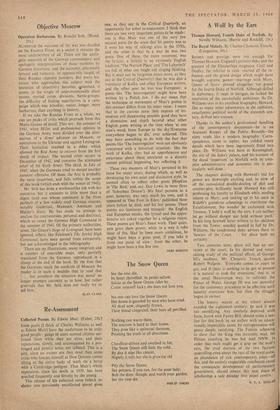A Wolf by the Ears The Royal Malady. By Charles
Chenevix Trench. (Longmans, 30s.) RICHES and prestige were not enough for Thomas Howard, England's premier duke and the greatest of the Elizabethan magnates. Cecil and Dudley. far inferior in rank, exerted all the in- fluence, and the grand design which might have brought supreme power—marriage with Mary, Queen of Scots--proved altogether too grand for the fourth Duke of Norfolk. Although skilled in diplomacy, if inept in intrigue, he lacked the resolution of the successfully ambitious. As Dr. Williams says in his excellent biography, Howard, like so many other adventurers in the turbulent, cataclysmic political world of the sixteenth cen- tury, drifted into treason.
Thanks to the author's professional handling of the contemporary documents--he is an Assistant Keeper of the Public Records—the story reads like a modern biography. Corre- spondence, some in cipher, has yielded many details which have been ingeniously fitted into place. Dr. Williams was born at Kenninghall, the site of the duke's palace, and his account of the ducal 'imperium' in Norfolk with its com- plex administrative and economic life is par- ticularly well done.
The chapters dealing with Howard's bid for power are downright exciting and, in view of all the convoluted double-dealing of plot and counter-plot, brilliantly lucid. Howard was still 'professing his loyalty to Elizabeth while sending tokens to Mary, and sinking up to his neck in Ridolfi's grandiose schemings to overthrow the Establishment. No wonder he exclaimed with Terence, 'I hold a wolf by the ears. I can neither let go without danger nor hold without peril.' In his long farewell letter written to his children from the Tower, sensibly quoted in full by Dr. Williams, the condemned duke advises them to 'beware of the Court . . . for place hath no certainty.'
Two centuries later, place still had no cer- tainty at the court. In his shrewd and enter- taining study of the political effects of George III's madness, Mr. Chenevix Trench quotes Robert Walpole: 'Everyone comes to court to get, and if there is nothing to be got at present it is natural to look for reversions,' that is, in the usual Hanoverian way, to cultivate the Prince of Wales. George 111 was too powerful for the customary procedure to be effective until insanity overcame him, but then the struggle began in earnest
The history master at my school always avoided the eighteenth century; he said it was too unedifying. Any similarly deprived sixth form, bored with Fanny Hill, should make a bee- line for this book by an author with an educa- tionally impeccable name. Its outrageousness will prove deeply satisfying. The Foxites scheming to show that the King was incurably mad, the Pittites asserting he was but mad NNW, in order that each might get a grip on the wolf's ears, the rival doctors of the two factions quarrelling even about the rate of the royal pulse, an abundance of sick contemporary jokes—all this, and the entirely respectable conclusion about the consequent development of parliamentary government, should ensure this neat piece of scholarship a safe passage into paper covers.
B. C. L. KEELAN


































 Previous page
Previous page